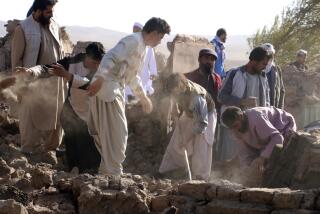Peacekeepers Greeted by Mixed Feelings
KABUL, Afghanistan — British soldiers were trying to start their mine-clearing machine. French forces were setting up a hospital--and politely declining shots of vodka offered by Russian peacekeepers to celebrate Eastern Orthodox Christmas.
Off to the side at the bomb-cratered Kabul International Airport on Monday, Afghan fighter Abdul Sahmin watched silently. He and other former Northern Alliance soldiers had been here more than a month already, a month in which peace reigned not just at the airport but throughout the capital. He wasn’t certain they needed help.
“I’m an ordinary soldier, and it’s not my decision whether they come or not,” said Sahmin, 28. “If they have come for peace and for peacekeeping, fine. If they have come to take Afghanistan, they should be ready for a fight.”
Three days after Afghan interim Prime Minister Hamid Karzai approved an agreement authorizing 4,500 international peacekeepers to help stabilize Kabul, the forces were streaming in, under the watchful eye of a people who have never welcomed foreign soldiers for long.
‘We’re Very Happy’
While Afghan military men--many of whom have long provided security to the highest bidder--and some government officials are clearly wary of the International Security Assistance Force, residents of the war-ravaged city seem at times ecstatic over the arrival of the peacekeepers.
“We’re very happy, very happy,” said Khwaja Mohammed, 55, as he sat cross-legged on the floor of his brother’s shotgun shop--hunting guns only--at the main bazaar here. “The Afghan soldiers could not control Kabul.”
Advance elements from several nations arrived here even as negotiations over the precise makeup and mission of the peacekeeping force was being hammered out in Germany last month. But troops have poured in over the last few days, with more than 1,500 on the ground now.
British troops have begun patrolling the city, setting out from the peacekeepers’ headquarters, near the U.S. Embassy in the center of the city, in armored trucks and jeeps. The soldiers have been heavily armed but helmetless, as is the tradition for many peacekeepers, who believe wearing a beret makes them more approachable.
The patrols thus far appear to be limited to small convoys, with the soldiers cruising the city but not walking the streets. More visible outings are expected to begin when more of the international force is in place.
Under the six-month, renewable agreement, which was signed by Maj. Gen. John McColl of Britain and Afghan Interior Minister Younis Qanooni, the British will lead the contingent for the first three months. The British force, slated to grow to 1,500, is by far the largest among the 16 countries that have pledged peacekeepers.
About 200 French soldiers have arrived within the last few days, and 300 more are on their way. They are erecting a mobile surgical hospital and securing the Kabul airport, which has an estimated 18,000 mines spread around the airfield and bomb craters as large as 15 feet deep and 25 feet wide, some from U.S. attacks. Even so, French commanders said Monday that they expect to have the airport fully operational sometime next week, though de-mining and other work will continue.
German, Danish, Turkish and other forces have begun arriving as well, to provide everything from surgical teams to well diggers. The U.S., having decided not to prosecute a war and act as peacekeeper at the same time, is not part of the force but has promised to provide communications, logistical help and air support for the other nations.
Terms of the peacekeeping agreement provide for a potentially awkward situation: British troops patrolling Afghanistan’s capital city while Afghan troops look on.
“This is the decision of the elders,” said an Afghan soldier named Abdullah. But he added: “At this time, I think it’s a good thing. When one [nation] has a problem, others should come and help it. This is their responsibility. They’re not doing any favors for us.”
Some people here and abroad are questioning the confinement of the peacekeeping deployment to Kabul.
A relative calm appeared to settle over the country immediately after the Taliban was swept from power, but about the only tranquil place left a month and a half later is Kabul.
Bandits Are a Problem
Banditry is rampant in many parts of Afghanistan; the southern city of Kandahar, spiritual center of the Taliban, has become so dangerous in recent weeks that the United Nations has sometimes ordered its employees not to go to work; in the east, the U.S. continues to bomb suspected terrorist encampments; and near the western city of Herat, Afghan authorities have reported inter-tribal skirmishes.
Some wonder if the peacekeepers might be more useful elsewhere, while others argue that true stability in the capital and government will eventually spread to the rest of the country.
“Kabul is OK,” said Jawaid Mohammed, a hat salesman.
“You can see this used to be a thriving capital,” said U.S. Army Col. Wayland E. Parker, the U.S. chief liaison to the international force. “This city needs peacekeepers.”
To many people here, such debate is wholly academic.
When some of the French and British convoys rolled into town, people lined the streets to wave and cheer. “It was like WWII, when the Americans came to Paris,” said Col. Jean-Marc Marill, the commander of the French contingent.
Abdul Zaheer hasn’t seen any of the peacekeepers yet, but he knows they are here now, and he hopes their title proves accurate.
“All we want now is peace,” the 22-year-old said. “Maybe they’ll bring it.”
More to Read
Sign up for Essential California
The most important California stories and recommendations in your inbox every morning.
You may occasionally receive promotional content from the Los Angeles Times.










